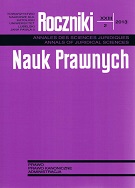Encefalopatia jako przyczyna nieważności małżeństwa w świetle wyroków trybunałów kościelnych
Encephalopathy As a Cause of Annulment of Marriage in the Light of the Judgments of Ecclesiastical Tribunals
Author(s): Anna GołębiowskaSubject(s): Law, Constitution, Jurisprudence
Published by: Towarzystwo Naukowe KUL & Katolicki Uniwersytet Lubelski Jana Pawła II
Keywords: encephalopathy; a disorder; invalidate; inability; encefalopatia; zaburzenie; unieważnić; niezdolność
Summary/Abstract: From the analysis of the cases for the annulment of a marriage result that encephalopathy as a personality disorder causes a serious lack of discretionary judgment concerning the essential matrimonial rights and obligations mutually given and accepted (can. 1095 CIC No. 2 of 1983) and the inability of people to take up and fulfill the essential obligations of marriage (can. 1095 CIC No. 3 of 1983). In the judgments of ecclesiastical tribunals Judging College, opinions can be found which point to a defective functioning of personality traits, in this specific case of encephalopathic personality, which is a consequence of damage to the central nervous system. Disturbed encephalopthic personality does not always automatically lead to the inability of people to take the essential obligations of marriage, yet its impact on the psyche and consequently the ability to make a covenant marriage is quite significant as evidenced by studies of psychiatric and religious processes. This article presents decisions of the ecclesiastical courts which show that the disturbances caused by encephalopathy result in the inability to create positive and lasting marriages. In addition, people with this type of personality were not able to give valid consent, despite the declared willingness to persevere in marriage and made promises to change their current behavior.
Journal: Roczniki Nauk Prawnych
- Issue Year: 23/2013
- Issue No: 2
- Page Range: 73-92
- Page Count: 20
- Language: Polish

